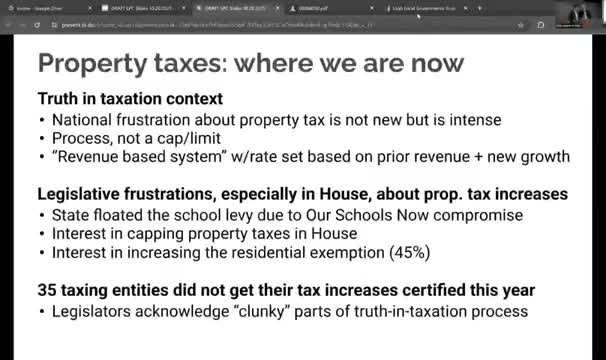League panel warns truth-in-taxation reforms could sharply shift who pays property taxes
Get AI-powered insights, summaries, and transcripts
Subscribe
Summary
Speakers at the Utah League of Cities and Towns Legislative Policy Committee cautioned members that a suite of legislative ideas — from technical fixes to caps and changes to the residential exemption — is under active discussion and could change how property-tax burden is allocated across homeowners, school districts and other taxing entities.
Speakers at the Utah League of Cities and Towns Legislative Policy Committee spent more than an hour on Oct. 20 reviewing the state’s Truth in Taxation process and potential legislative changes that could limit local governments’ ability to raise property-tax revenue.
The committee heard a historical overview from Roger (tax policy advisor), who said Truth in Taxation — the state process that governs how local governments notify residents and seek approval for property-tax increases — has largely worked as intended since its adoption in 1985 but contains “clunky” notice and procedural requirements that tripped up dozens of taxing entities this year. "The process is still in your hands," Roger said, while warning that other proposals could take away local flexibility.
Why it matters: Cities, counties, school districts and special districts all rely on property-tax revenue for services and infrastructure. Any change to the Truth in Taxation triggers, timing or the residential exemption could move revenue between property classes (residential vs. nonresidential) or cap local revenue growth, affecting budgets across jurisdictions.
Key details from the meeting
- Recent compliance failures: Multiple taxing entities failed to get certified tax rates this year after the Utah State Tax Commission tightened its review to the literal wording of statutory notice requirements. Roger and staff described the primary notice (a mailed notice to property owners) as effective but said a secondary, online notice requirement — which must enumerate all taxing entities and can bury information several pages deep — caused many of the problems.
- Legislative change two years ago (referred to in the meeting as SP29) removed discretion from the Tax Commission to rely on “substitute compliance,” making exact compliance with notice and hearing rules mandatory; speakers attributed this shift as a major cause of the certification shortfalls.
- Potential reforms under discussion: committee members and staff reported legislators are weighing (1) technical fixes to notice and certification procedures; (2) moving the Truth in Taxation hearing earlier in the budget cycle so public comment occurs during, not after, budget adoption; (3) caps on annual property-tax increases (a model similar to recent law in other states); and (4) changes to the residential exemption that shifts the taxable share between homeowners and commercial/industrial owners. "Be really careful what we ask," Roger said, cautioning that proposals that limit municipal flexibility could lead to broader changes statewide.
- Residential exemption: The panel reiterated that the residential exemption is a voter-approved constitutional amendment (1982) that sets residential property at a 45% taxable value (equivalent to taxing it at 55% of full value). Speakers noted changing that constitutional provision would be a large undertaking and could have unintended distributional effects — e.g., cities that are primarily residential would see little net change in local revenue if the state simply shifted the burden among taxing entities.
- Practical complications to timing changes: Staff cautioned that moving Truth in Taxation triggers earlier in the calendar would be logistically difficult because certified tax rates are generally not available until mid-June; counties and the Tax Commission would need to accelerate processes, or municipalities would have to rely on preliminary estimates.
What officials said
Roger, addressing the committee: "If you want additional money, go through this process." He praised the mailed notice as the most important public notice instrument but said online notice requirements and hearing agenda rules caused many entities to lose certification this year. Justin (League staff) urged members to collect local examples of “clunky” notice elements for the League to share with legislators.
Next steps and local impacts
League staff will compile the membership’s priorities and a list of procedural issues (the “clunky” elements) to deliver to lawmakers and the Tax Commission. Speakers urged local officials to consider preliminary Truth in Taxation hearings as a local workaround but stressed legal triggers and certification timing must be resolved at the state level.
Ending
Committee members said the conversation will remain central to the League’s legislative work this winter. Several presenters emphasized that technical fixes may be achievable, but proposals that significantly limit local authority — such as strict annual caps — could reduce cities’ ability to respond to local service needs and shifting demographics.
